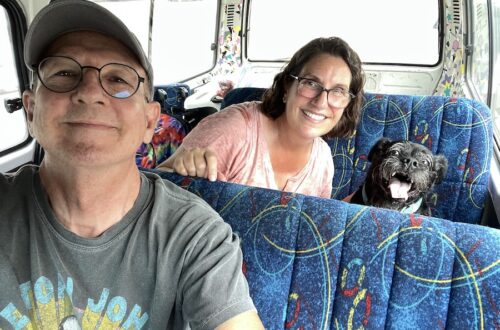
Life Without A Car?
Vic and I have been in Panama for 78 days! Since moving to Chitrè a month ago, we have taken some time to settle in. So what’s been happening?
After getting our driver’s licenses, we decided to buy a car and even contacted someone to help us find a good used car in our budget. We also started the process of transferring money to our Panamanian bank account.
By the way, that sounds so funny to me that we have a bank account in another country. While it is necessary to obtain a visa, it is also easier to conduct business using their banking system. Transferring money from out of your home country can take some time, but if you’re not in hurry and plan in advance, you can avoid more costly transfer fees.
The great thing about a slower pace and choosing to wait is that you get a moment to think. After thinking it through, we decided to follow our gut and put on the brakes to see what life could be like without our own car. We have never lived without our own transportation, but then again, we have never lived somewhere with good public transit or walkability to all life’s necessities.

One of the many benefits of the home we chose to rent in Chitrè is its walkability to shopping and the local bus terminal. A short 11-minute walk gets us to the bus terminal that can transport us anywhere in our city and Panama. FYI – a bus ticket from Chitrè to Panama City (a four-hour trip) is about $10 one way, but if you are here on a retirement visa, you get a 30% discount. A recent bus ride to the local mall was only $.35. It came with the added benefit of listening to and speaking Spanish. The more practice we get, the faster we will learn and fit in to this wonderful culture.
We can leisurely walk to our favorite grocery store in 15 minutes. Instead of walking home with heavy bags, we can easily catch a cab home for $1.35 to $1.65 (no tip necessary). A strip mall with a medical clinic, optometrist, a coffee shop, fast food, a fabric shop, a party supply, and a nice home goods store are attached to the grocery store.

If the weather is bad or we don’t want to walk, we can always call a taxi to pick us up at the house. This option does require being able to speak and understand Spanish over the phone. A cab usually arrives within five minutes. The phone call does require a little planning ahead; we have found that writing out what we need to say in Spanish and what responses we might hear has helped. The only way to get better at anything is to practice.
Pets are not allowed on public buses or taxis, but we could always rent a car to take our fur babies with us on vacation or explore on our own. We will definitely do this at at some point.
It has been an adjustment not having our own car. We have spent our entire adult lives just getting in our own vehicle and going whenever and wherever we wanted. A little patience combined with a little planning and this slower pace is part of the lifestyle we want to enjoy. It’s no longer a race for us to get things done as fast as we can. Ironically, not having a car has helped us embrace this journey.
Arriving home last night in our taxi, I had looked up how to say “I hope you have a good night” to our driver in Spanish. “Espero que tengas buenas noches”. The cab driver smiled and replied “Buenas noches”. As Vic and I walked into the house we agreed that we are enjoying life here more with each passing day.






